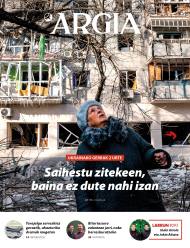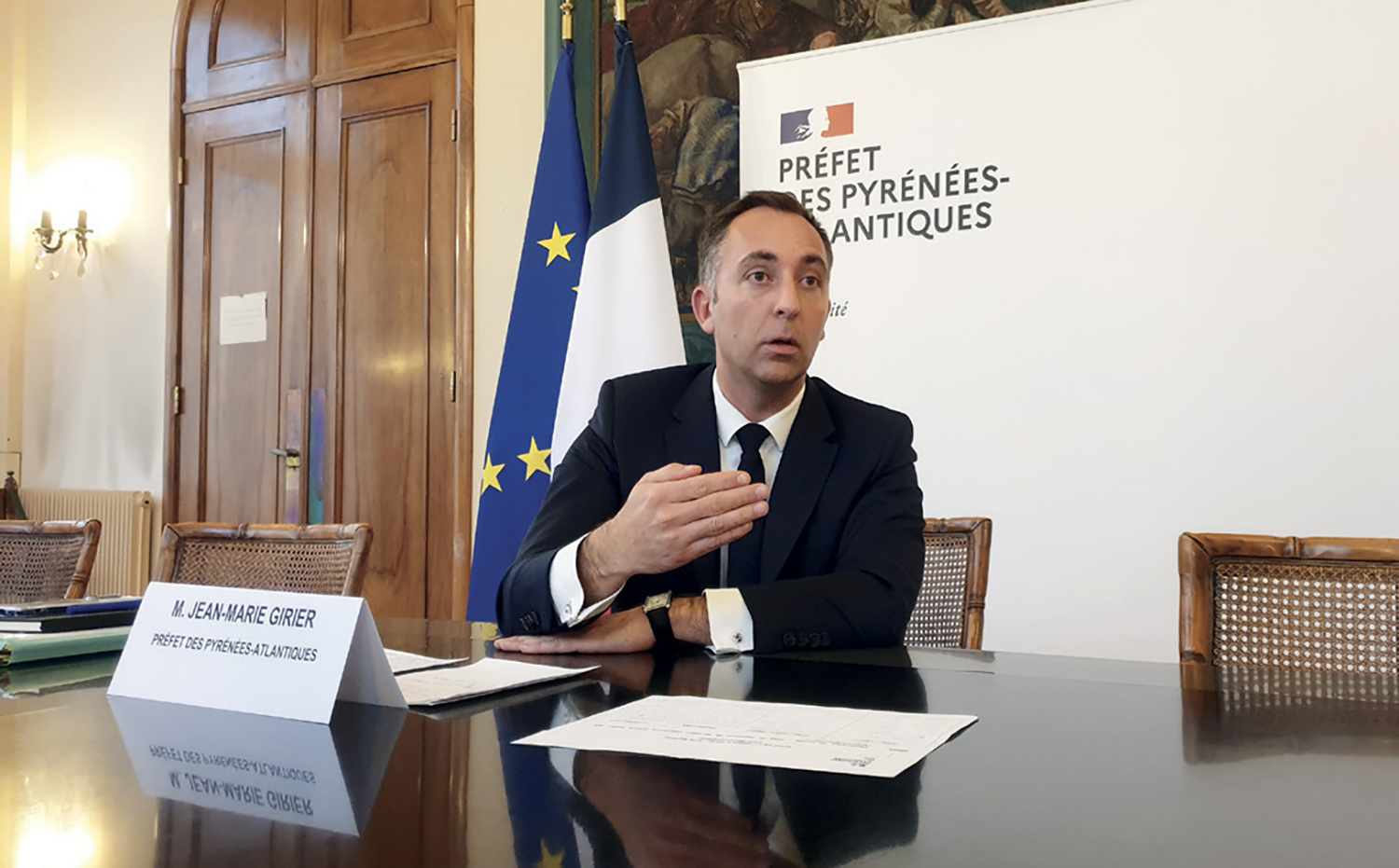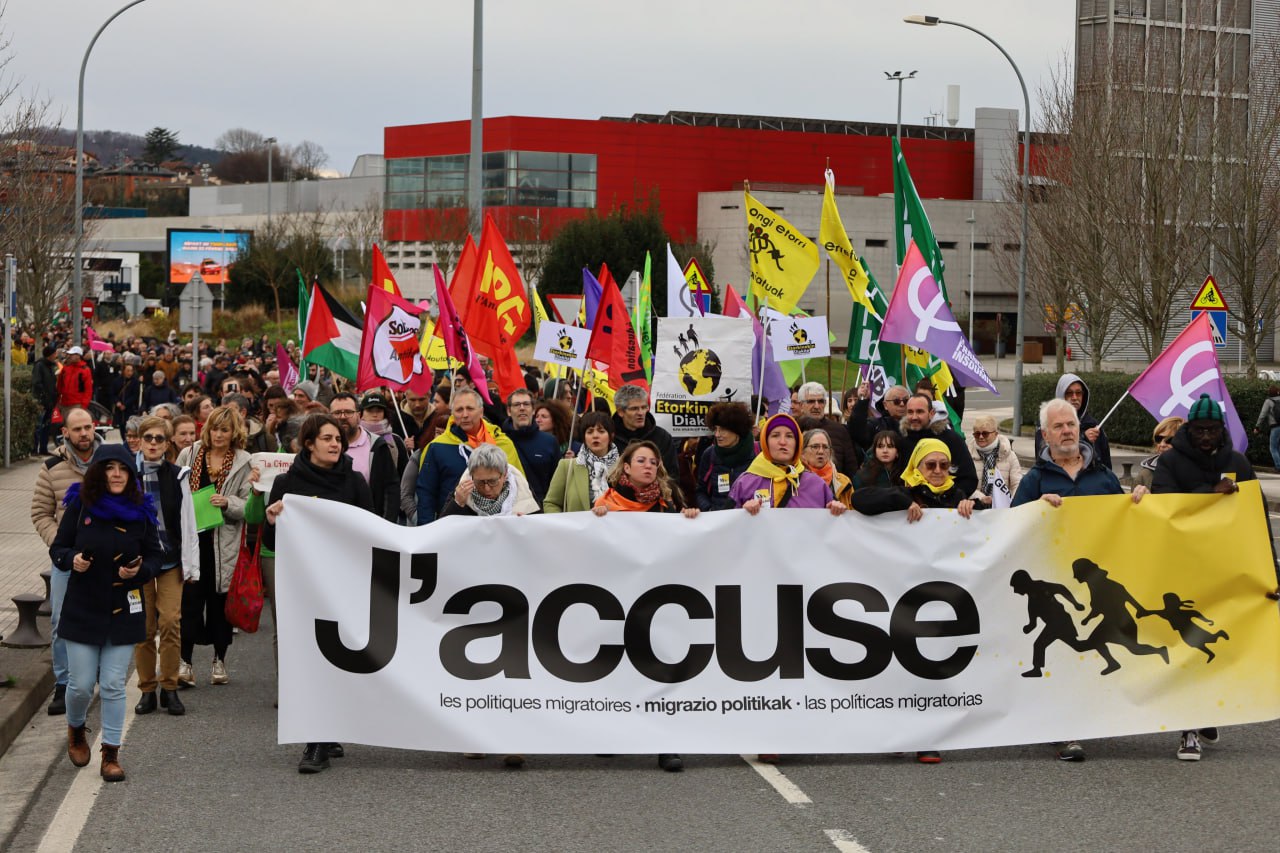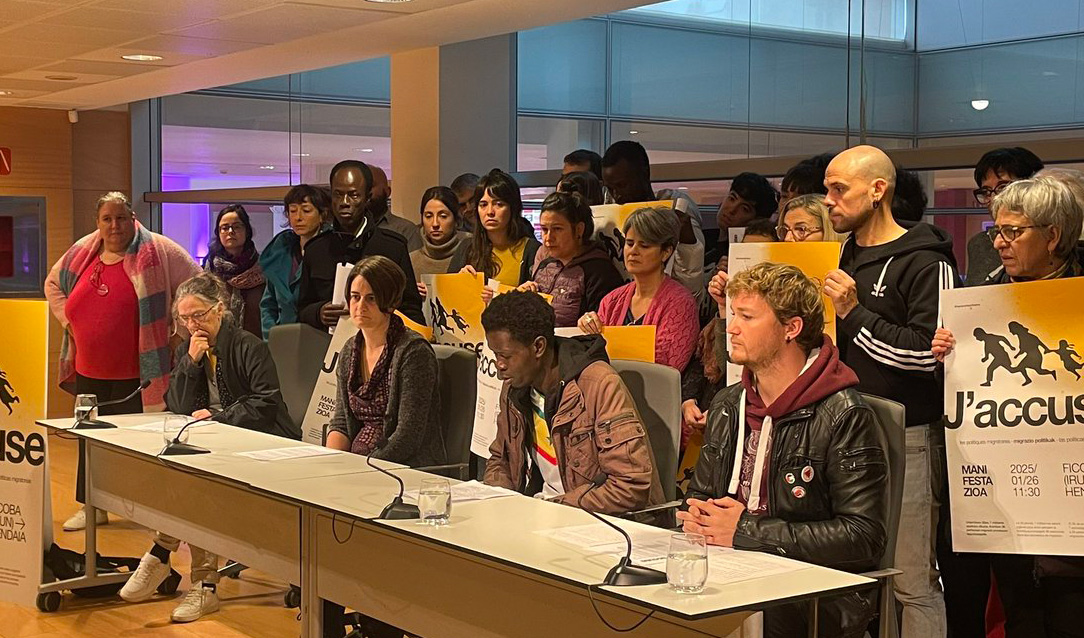10 years after the Tarajal massacre, the silent genocide on the Atlantic border
- On the Tarajal beach in Ceuta, fourteen people were killed ten years ago, trying to swim by sea to reach Europe, between the shots of the civil guard and the Moroccan police. His family and friends take advantage of his anniversary to seek justice, because the issue is still in court. Justice for them and thousands of people who have died after it on the immense southern border of Europe: In 2023 there were 6,618, according to the Ca-Minando Fronteras association. They have officially choked to death, but genocidal immigration policies have buried their bodies and their memory at sea.
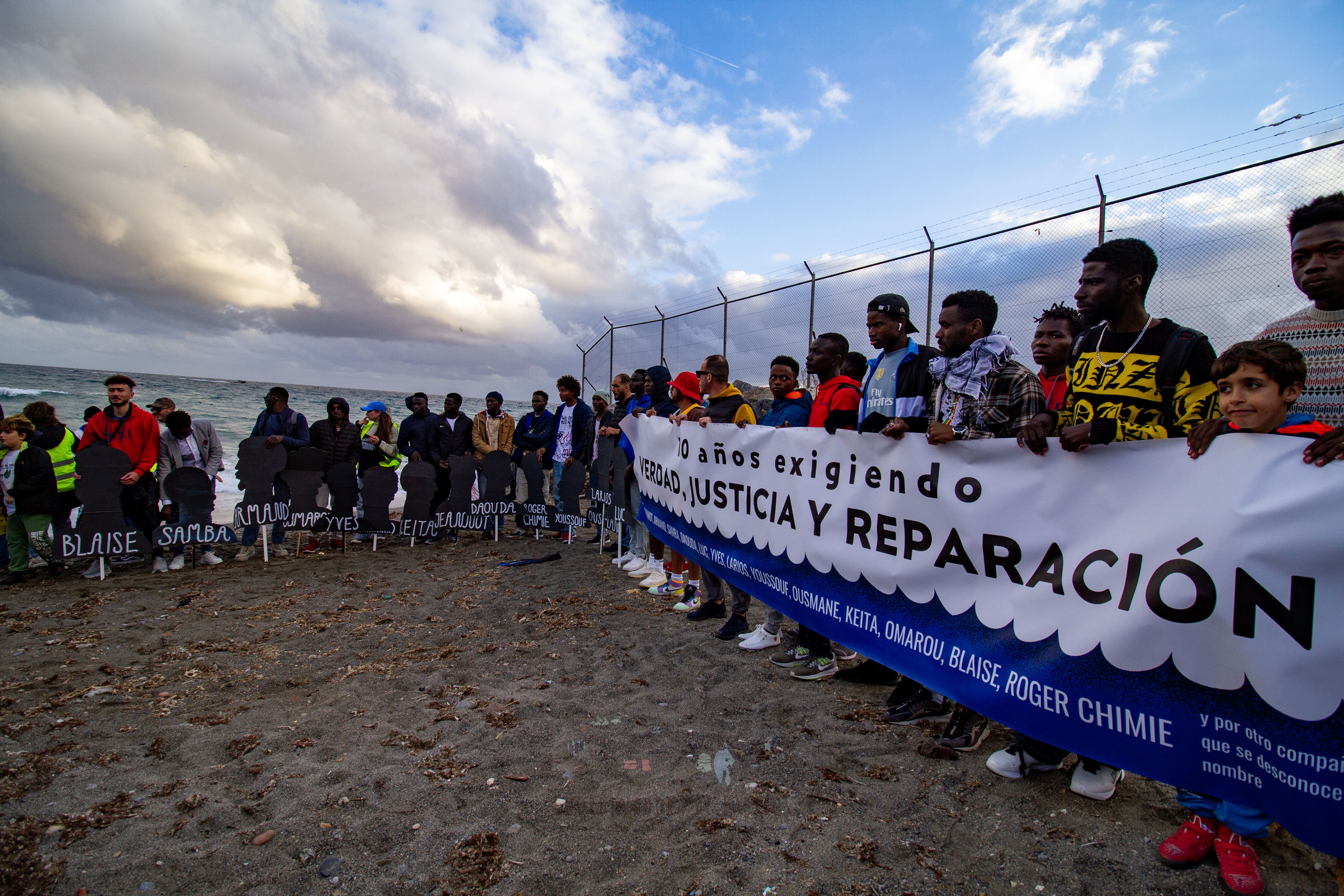
In Ceuta, a March of Dignity remembers the dead on the beach of Tarajal ten years ago. In the early hours of February 6, 2014, about 300 people started with the intention of passing through this catwalk that separates Morocco from the Spanish state, the majority of migrants fleeing the conflicting sub-Saharan countries. When detained by Moroccan police, many jumped to the sea, as the last opportunity to reach Europe was to swim around the beach spur. But on the other hand, they were awaiting the rubber pickles and smoke pots of the civil guards.
Some attacks come from motorboats running with motorcycles outside the anteches, practicing markup with others from the pier itself. Fourteen people died and only 27 managed to reach the beach, but were soon expelled and abandoned in the claws of the Moroccan gendarmes.
Some attacks occurred through boats running with motorcycles outside the anteches, making markings from the pier itself with others
If what has happened in the Tarajal massacre is special, it is not because of the indifference and cruelty of the border police, who have often shown us to be skilled before and after, but because of the desperate trajectory of the judicial case for ten years. Sixteen officers were called to testify in 2015, but the judge closed the case and have been repeatedly acquitted by appeals filed since then. Right now the relatives and friends of the deceased expect the Spanish Constitutional Court to take a decision.
“This is a clear example of how impunity for border crimes is built and how institutional racism practices are legitimized.” This is what the bilbaíno team of the March of Dignity says. Bilbao is one of the many groups formed throughout the Spanish State to carry out the mobilisation of Ceuta.
In a note sent to ARGIA, it is said that this southern border has become a “no place”: a territory in which legislation is established differently, in which “geography adopts another legal concept”, as former Spanish Interior Minister Jorge Fernández Díez said. For the Bidasoa border we have inside our house, this statement would be exactly the same.

Yves, Samba, Daouda, Armand, Luc, Roger Chimie, Larios, Youssouf, Ousmane, Keita, Jeannot, Oumaurou, Blaise and another person who does not know what it was called. Everyone has been remembered in the March of Dignity. But they also denounce the “genocidal border regime”: “It is important to understand that all this naturalizes and extends the colonization war that began with the 1492 regime. It reproduces racial hierarchies under the fallacy of democracy and human rights, and that is done within its geopolitical and capitalist logic.”
In the long judicial process, the survivors of Tarajal have re-criminalized themselves, and what is more serious, the idea that migrating is a crime is reinforced because they “migrated” as if the guilt were of those people.
“I am Daoud’s brother”
Associations defending the rights of migrants believe that international migration policy is “necropolitical”, as the right to be remembered and to have a dignified mourning is denied to the dead. According to lawyer Tarajal, Patricia Fernandez, “one way of racism is to think that crying for some people is not worth it because death has become part of her life trajectory.”
Associations defending the rights of migrants believe that international migration policy is “necropolitical”, as the dead are denied the right to be remembered and to have a dignified mourning
This has been the 11th edition of the March of Dignity, which has been supported by 250 associations, many of them Basque. The small stone beach in Ceuta brings together on 3 February dozens of people who carry posters in their hand, others have opened a long banner that demands truth, justice and reparation, in the shadow of the threatening border barrier.
“I am the older brother of Daouda, one of the victims of the Tarajal,” one of them begins. The newspaper La Marea has collected its full testimony: "In remembering these ten years I want to share with you some of my feelings. A bitter thing fills our hearts and those of our families. I speak with sorrow and with great sorrow, ten years after our brothers were after, difficult years. As they died, how the government shot them… that only deepens the pain.”
Cameroon to Europe, arm swimming in blood
Ludovic N. Cameroonian – not his real name – was 15 years old when the Tarajalgo happened. Years earlier he fled with his uncle from his village and began an endless journey: after crossing the desert they were arrested in Algeria and separated, the boy survived for a year and a half in Morocco, in clandestine camps. During that time he tried to enter the Spanish State on several occasions, but at other times he was captured, beaten and expelled from the desert.
6 February 2014 Ludovic N. It was on the small beach of Ceuta. Now, your complaint has been transferred to the United Nations, and through a valuable document released by the European Centre for Human and Constitutional Rights (ECCHR) on its website we can learn what happened to you.
The Camerunés could not swim, so he took a float and launched himself to the search for the desired freedom, grabbing himself to the stones of the Tarajal beach saddle. But the agents welcomed him with blows in his arms: What is it to leave those who do not know how to swim in the sea without handles, if not a murder attempt? With the arm scraped with blood and unable to breathe with the gas of crying, he continued until he reached the other side of the beach. He was soon returned to Morocco outside the border.
The deadliest year of the past six years
The death of a relative is painful, but when one cannot speak it becomes unbearable. The collective Ca-Minando Fronteras has raised the alarm by increasing silence on people who die at sea trying to enter Europe: the dead have become taboos because states respond with repression and arrests and their families are persecuted by stigma: “The social recognition of tobacco favours border control policies and inhuman racist discourses,” the association states in its latest report.
Ca-Minando Frontera has been working for more than twenty years to defend the rights of migrants (the ARGIA reader will surely know the name of its founder, Helena Maleno, journalist and activist persecuted by Moroccan justice), and every year publishes the Right to Life report in collaboration with institutions such as the Government of Navarra.
The bilateral “cooperation” agreements between the Spanish State and Morocco only seek to criminalize the migrant, with the confrontation against the “mafias”, for Rabat to send them further from the border.
The Ca-Minando Fronteras report monitors human rights violations and deaths on the western Euro-African border, which includes the Canary Islands, the Strait of Gibraltar, the Albora and Algeria routes, with a network that works “365 days a year and 24 hours a day”. The 2023 data is impressive: 6,618 people died at sea trying to enter Europe through this border. This figure, in itself, should be enough to create an international media earthquake ... No, and you can wait.
Since the report began six years ago, last year has been the deadliest, three times the previous year. The vast majority of deaths occurred on the dangerous Atlantic routes to the Canary Islands, namely 6,007 deaths.

Preventive repression of Senegal
Senegal has become one of the main starting points for migrants. The country is governed by a colonial system of foreign companies extracting natural resources. In the face of the precarious economic situation and the protests against President Macky Sall in the electoral context, thousands of young people and adolescents have left the street, but many have no choice but to migrate in the cayucos: 843 Senegalese have died on these trips in October, only in one month.
.jpg)
European countries have outsourced migration control and given states of origin the task of repressing migrants. Thus, the Government of Senegal, using pejorative concepts such as “potential” migrants, arrests many of them preventively before leaving. Furthermore, the citizen who returns to his people after suffering ill-treatment often has to live with a sense of failure and guilt, which generates great silence around him.
The bilateral “cooperation” agreements between the Spanish State and Morocco are in the same direction: they only seek to criminalise migration, with the fight against the mafias. Madrid entrusts Rabat with sovereignty over large maritime areas to send people who want to move to Europe further away from its borders.
Many migrants have travelled further south, to the area between the Moroccan cities of Agadir and Dajla of Western Sahara, from where they barely float in pneumatic boats to head to the Canary Islands. This, of course, as the risk has increased, so has the number of deaths in 2023: 1,418 people have lost their lives.

84 boats swallowing entire oceans
The greatest risk is for citizens travelling from Gambia. Every year, normally starting in mid-October, many people leave their ports on ruthless boats to navigate to the Spanish archipelago located thousands of kilometres away.
Last year, at least 84 boats disappeared in the ocean to cross the Euro-African border, leaving no trace. There are no statistics around him, they are as invisible as they are inmemorable and, like the fourteenth friend who died in Tarajal, his name is not known
When a shipwreck occurs on an extensive African coast, coordination of many countries is needed to seek victims “actively”, but Ca-Minando Fronteras denounces that this is not the case: “As in other Atlantic routes, searches are also carried out here with a simple look of control.”
On 19 October 2023, a cayuco left Cartong, on the border with Gambia and Senegal, transporting 155 migrants. 155 people hoping to cross the doors of Europe through the Canary Islands and have a more dignified life. Three weeks later, the family members contacted seriously the members of the Ca-Minando Fronteras collective, who they still did not know. It was originally opened for the rescue of the Algerian coastguards, but it was a false rumor. They have not appeared anywhere, the sea has swallowed them like many others.
The proactive group on the rights of migrants has assured in the report that last year, at least 84 of these boats disappeared in the ocean trying to cross the Euro-African border packed with people without leaving any trace. There are no statistics around him, they are as invisible as they are inmemorable, and as the fourteenth friend who died in Tarajal we do not know his name.
Hamasei migrante atxilotu zituzten otsailaren 6an Baionan, etorkinen eskubideen aldeko elkarteek salatu dutenez. Dirudienez, Baionako prokuradoreak eman zuen agindua. Operazioa autobus geltokiaren eta Pausa harrera zentroaren artean gauzatu zuen poliziak, tartean, adingabekoak... [+]
Zutabe hau idazten nengoela, gaia aldatu behar izan dut, nire arreta osoa harrapatu dutelako Trumpen muga-zergek. Azalpen gutxi beharko duzue, leku guztietan da berria, Txinako produktuei %10eko zerga eta Kanadako eta Mexikoko produktuei %25eko muga-zergak jarri dizkie. Trumpek... [+]
To be honest, I don't know why I'm writing this. In today’s hostile environment, opinions of this kind are not well received. Perhaps LUZ will not publish this because it does not correspond to the opinions they have published so far (but if they have finally decided to publish... [+]
We Basques move our feet behind the witness of Korrika to proclaim that we want to survive as a Basque people in favor of our language, with the aim of the Basque Country we desire.
The tipi-tapa is the first step taken by a migrant person who leaves his homeland in Africa,... [+]









